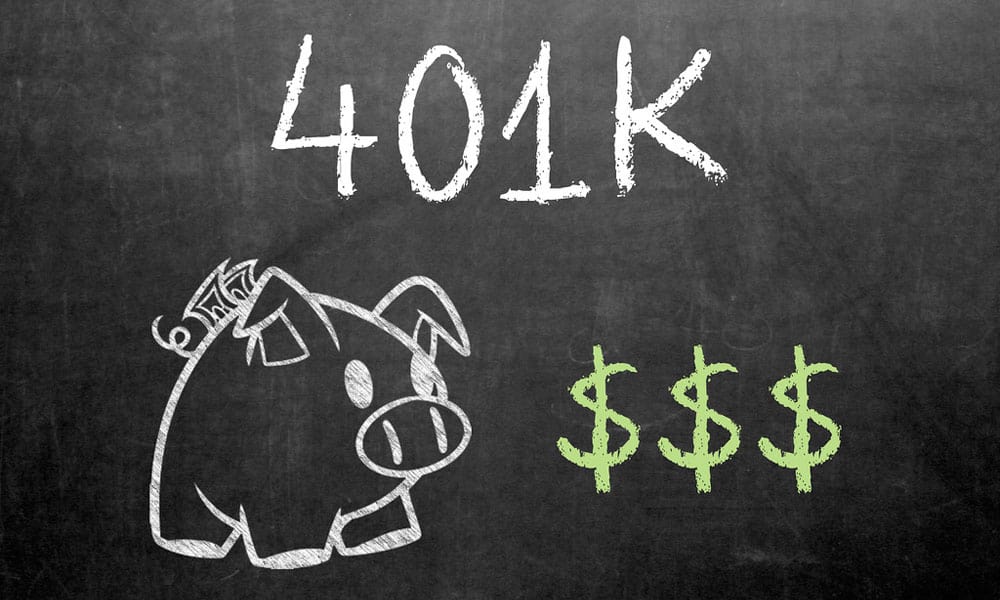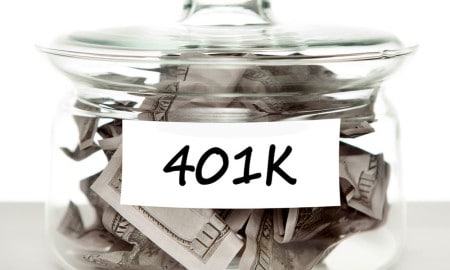

There are loads of mysterious questions in life:
- Why are we here?
- Is the universe finite or infinite?
- Why does obnoxious Uncle Larry have to get drunk and spoil every holiday (and why do we keep inviting him?)
- How much should I have in my 401k?
I’m sorry to report that I don’t have an answer for the first three questions. However, I can help you out with 401(k)s.
Why the 401K?
Long term readers know that I’m completely and totally obsessed with 401(k)s. At the tender age of 42, I have over $500,000 in my 401(k) accounts (I’ll reveal my actual number in a moment).
They are wonderful for two main reasons:
- 401(k)s help you reduce your tax bill. Every dollar you invest in your 401(k) is a dollar that you don’t have to pay taxes on. If you’re single and make $75,000 per year, contributing $10,000 to your 401(k) saves you $2,500 in taxes. Contribute the maximum $19,500 and you’ve saved nearly $5,000. And that is just for one year! Think of the money you’ll save over decades, or better yet, use this 401k calculator to run the numbers.
- Your employer is giving you free money. In many cases, your employer will match part of your contribution. Free money! If you aren’t contributing, you are turning down money that someone wants to give you. Ridiculous!
There are many other reasons why a 401(k) is worthwhile. For a full run down, see my recent post on the matter.
How Much Does The Average Person Have In Their 401k?
Before I tell you how much you should have in your 401(k), let’s see how much the average person has in their 401k. I borrowed this chart from my friend Sam over at Financial Samurai:
The average 401k balance
| Age | Years Worked | Low End | High End | Notes |
|---|---|---|---|---|
| 22 | 0 | $0 | $0 | |
| 23 | 1 | $3,000 | $6,000 | |
| 24 | 2 | $6,000 | $12,000 | |
| 25 | 3 | $10,000 | $20,000 | |
| 30 | 8 | $35,000 | $50,000 | |
| 35 | 13 | $75,000 | $110,000 | All good until here |
| 40 | 18 | $100,000 | $150,000 | |
| 45 | 23 | $130,000 | $200,000 | |
| 50 | 28 | $225,000 | $300,000 | |
| 55 | 33 | $270,000 | $350,000 | |
| 60 | 38 | $345,000 | $500,000 | |
| 65 | 43 | $400,000 | $800,000 | Why such a shortfall? |
OBSERVATIONS
- I’m killing it! The first thing I did was compare my wife and I to these numbers. I’m close to 40 and according to the chart, an average person my age has between $100,000 and $150,000 in their account. I have about $500,000 in my account and my wife has $225,000 in hers. We are both way above average.
- But, we could have done much better: Neither my wife nor I have maxed out our accounts in all years. Part of this was a silly mistake on my part. When markets were crashing during the Great Recession, I dialed back my contributions when I should have been doing the opposite.
- Welcome to Walmart! The most painful fact on the chart is that the average 65 year old only has between $400,000 and $800,000 in their retirement account. According to U.S. News, those numbers are wildly optimistic. If you’re 65 and have $400,000 in your 401(k) with no other retirement savings, you better not plan on quitting any time soon. I hear Walmart is hiring. Repeat after me: “Welcome to Walmart!”
Why Should I Contribute To My 401(K)?
At this point you’re probably wondering, “so just how much should I contribute to my 401(k)”? What’s the magic formula?
Figuring out how much you should put in your 401(k) is quite simple. It’s also complicated.
Confused yet? Let’s get right to it. Here is how much you should have:
You should have as much as you possibly can in your 401(k) account! Click To TweetIf you’ve ever wondered “should I max out my 401(k)”, the answer is probably yes!
Allow me to elaborate. Retirement isn’t what it used to be:
- The era of the pension is largely over. Your company no longer feels that it’s their responsibility to see that you have a nice, comfortable retirement. For most, there will be no safe and steady income stream courtesy of the cube farm you spent the last 40 years slaving away in. You probably won’t get a gold watch either. The best you can hope for is that you leave on our own terms and in good health.
- Social Security will be there, but… Social Security is a sacred cow that no politician in their right mind would let die. Seniors vote in force. However, don’t expect to get the same money from it at the same age that your parents did. As Uncle Sam struggles to make ends meet, entitlement programs will be modified. These modifications will not be in your favor. Retirement ages will go up. At the same time, those payments will go down.
- You will live longer. I have some good news and some bad news for you. The good news is that you will probably live longer than your parents. Modern sanitation and medicine will see to it. The bad news is that you will probably live longer than your parents. Yes, this is good and bad. No one wants to die before their time, but it costs money to live. The longer you live, the more money you need.
How Much Should You Have In Your 401k?
I just gave you some awful news. Now, let’s talk about how to fix it.
Your 401(k) can solve your retirement problem. Embrace it. Live it. Love it. Most importantly, shove every cent you can into it.
- Are you thinking of buying a new car? Not a chance buddy unless you’ve already maxed out your 401(k).
- Thinking of moving to a swell home in the suburbs? Not unless you’ve given Mr. 401(k) his full contribution for the year and the new house won’t prohibit you from doing so in the future.
- Thinking of paying off your overdue credit cards? Well, maybe you should do that instead. But after that, max out your 401k.
The power of saving regularly cannot be underestimated. To illustrate, let’s look at a little scenario. Saver Sheila is 25 and does the following:
- Save $12,000 per year. Sheila can’t afford to max out her 401(k), so she contributes $12,000 to her 401k every year.
- Saves for 30 years. This comes out to a total of $360,000 in 401(k) contributions (not counting what her employer matches).
- Earns an average of 7% per year. This is a modest return.
Just 30 years later, Sheila is a millionaire and then some!
Sheila’s 401(k) has been hard at work, more than tripling her money. Sheila won’t have to work at Walmart and rely on that annual income to make ends meet.
Thanks to her savings rate, employer matching, tax deferment, and the power of compound interest, Sheila will have a good retirement thanks to Mr. 401(k).
Allow me to elaborate on my advice. It really cannot be understated how important this is:
You should have as much as you possibly can in your 401(k) account! Try as hard as you can to max it out. If you cannot do that, at least put enough money into it to get your full employer match.
Don’t worry if your fund choices are not the best. Statistics show that you’ll probably switch jobs at least a couple times before you retire. At that time, you can roll over your high fee mutual funds into a low fee provider.
In the meantime, you’ll be getting the tax savings from your contributions and gaining a return on your tax-deferred investment.
A NOTE ON UNCOVERING HIDDEN 401(K) FEES
If you are worried about paying too many fees in your 401(k), you can always use Personal Capital’s free 401k fee analyzer to uncover hidden fees in your portfolio.
When I first ran the Fee Analyzer against my own portfolio, I nearly fell out of my chair. It told me that I’d pay $594,993 in fees over the next 26 years:
I moved my investments around and reduced my potential fees to less than $100,000:
I’d highly recommend signing up for a FREE account at Personal Capital to take advantage of their 401k analyzer. It might just save you $500,000 dollars (or more).
How Much Should You Have In Your 401k by age?
Still wondering “how much should I have in my 401k?”
While the exact amount you can have in your 401k by age 30, 40, 50 etc. will depend on your personal ability to save and contribute, investment returns, IRS contribution limits, and your employer match % – here are the 401k contribution limits for 2019.
How Much Should I Contribute To My 401k?
So exactly how much should you put in your 401k each year? For 2020, you can make a maximum contribution to a 401k of $19,500 (this is up $500 from the limit of $19,000 from the previous year). If you’re age 50 or older, you can contribute up to $6,000 more, up to the max contribution limit of $26,000 (up from $25,000 the previous year). Any employer matching is done on top of the limit.
Keep in mind the IRS sets 401k contribution limits and they are subject to annual re-adjustment, so you those contribution limits may be higher in the future.
WATCH AS YOUR 401(K) SNOWBALLS
Now that you’re always hitting your contribution limit because you’re keeping your cost of living low while sticking to your savings plan, all the while contributing as much as you can, sit back and watch as that 401(k) balance snowballs.
That snowball will allow you to be at peace with your personal finances. Never forget that the best part of having a big pile of money is that it frees you from having to worry about money.
Did I mention how great 401(k)s are?
Frequently Asked Questions
When Should I Contribute To A Roth IRA Instead?
Your retirement plan should always focus on leveraging tax deferment and a high savings.
By saving for retirement aggressively and putting your personal finance above personal gratification, you can build a nest egg that will pay for your lifestyle long after you stop working for your employer.
Your retirement age is not set at 65, it is simply a function of your personal burn rate and the passive income you can generate from your savings.
That low cost of living, tax deferment, those matching contributions from your employer, that consistent annual contribution to your 401k, your healthy savings account, and the power of compound interest can bring your retirement age down exponentially
With that said, which retirement accounts should you be contributing to in order to maximize your tax advantage?
The tax advantages of contributing to a 401k can differ from those of a Roth IRA, depending on your annual salary. A Roth IRA also offers more flexibility for accessing funds penalty-free, compared to a 401(k).
Always take full advantage of employer offers and contribute enough to your 401k to take full advantage of your employer matching, but read our article on saving in a Roth IRA vs a 401k to craft a plan that works for you. There are lots of ins-and outs and subtleties to retirement planning, and the better you understand those ins and outs, the better you can tailor plans that match your personal situation.
What percentage should you contribute to your 401k?
This question gets asked a lot online – several financial planning studies suggest that the ideal contribution is 15%-20% of your income, but if you’ve been reading InvestmentZen, you know you should aiming to save a lot more. Remember the shockingly simple math behind early retirement.
Can I lose my 401k if the market crashes?
Like with any investment, if you have exposure to the market in your 401k account, you do have a lot to lose in the short term if the stock market crashes – but not as much as you have to lose by not saving and investing – particularly if you’re young and have a long-time horizon.
If you are young and investing aggressively, the numbers show that you can actually benefit from a market crash, as long as you don’t panic and get scared away from the market. For more on the risk of stock market crashes, and why you should invest as much as you can anyways, as well as some tips on managing your portfolio, read more here.
When should you start a 401k?
As soon as you start working, you should start your 401k. You’re only limited by the minimum age limit for employment in the United States, which is 14 – employees can make contributions to their 401k plans from this age onwards.
However, it’s worth noting that employers are not legally required to include employees in their 401k programs until the age of 21, so keep this in mind.
What is a good 401k match?
Anyone who has worked multiple jobs will realize that employer 401K matching policies can be wildly inconsistent.
According to the Bureau of Labor Statistics, the average 401k match is 3.5%. a 2015 National Compensation Survey by the BLS found that sadly, of the 56% of employers offered 401k plans (not exactly an encouraging statistic in itself):
- 49% match 0% (keep in mind, this is of the 56% who even offer a 401k plan)
- 41% match contributions between 0-6% of an employee’s salary.
- 10% match contributions at 6% or more of salary.
The lesson is, if you’re one of the fortunate 10% whose employer matches 6% or more of their salary, get that maximum match every year!




























Pingback: Random Crap - 1500 Days to Freedom1500 Days to Freedom
Pingback: The AC Interview Series with Nate from Investment Zen | Adam Chudy.com